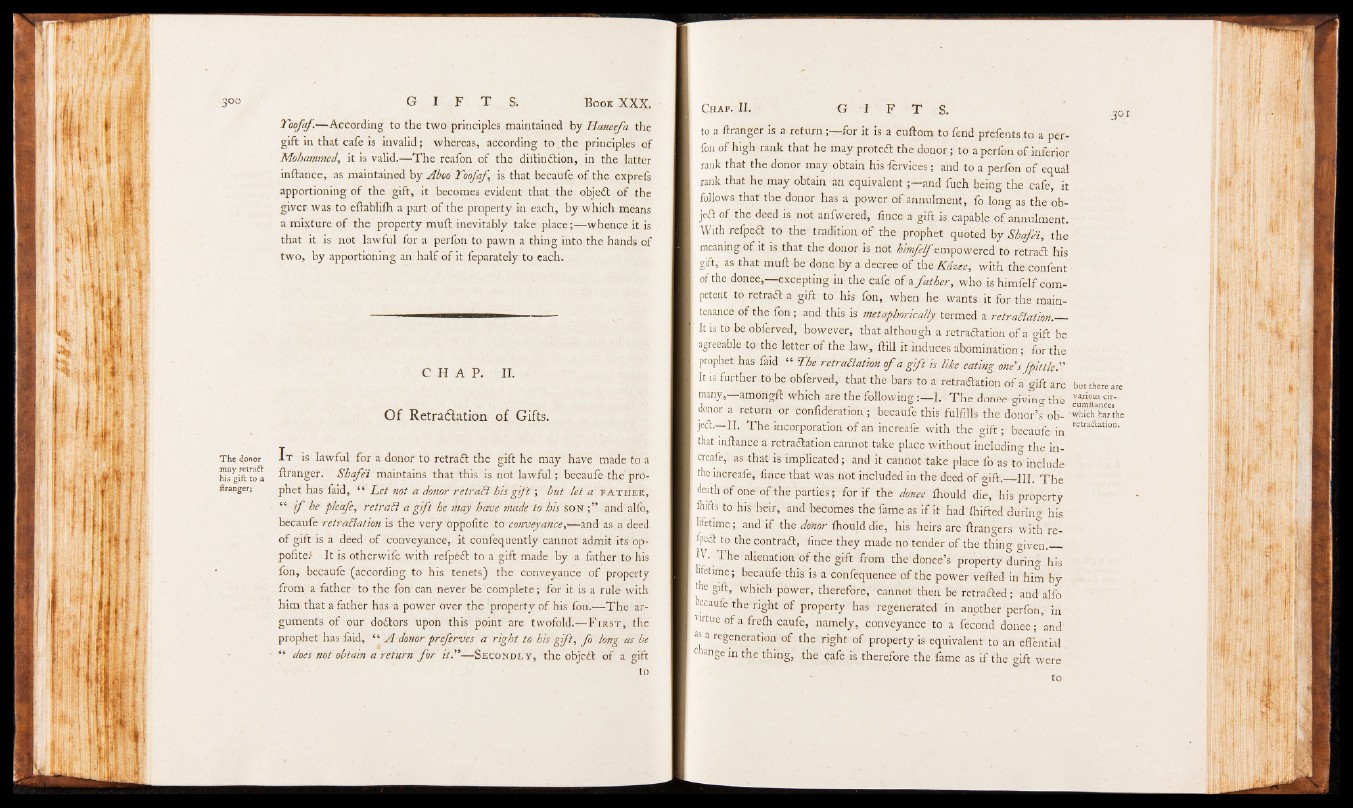
G I F T S ,
The donor
may retraft
his gift to a
ftranger;
Yoofaf.— According to the two principles maintained by Haneefa the
gift in that cafe is invalid; whereas, according to.the principles of
Mohammed, it is valid.— The reafon of the diftinftion, in the latter
inftance, as maintained by Abeo Yoofaf, is that becaufe of the exprefs
apportioning of the gift, it becomes evident that the object of the
giver was to eftablilh a part o f the property in each, by which means
a mixture of the property mull inevitably take place;— whence it is
that it is not lawful for a perfon to pawn a thing into the hands of
two, by apportioning an half of it feparately to each.
C H A P . II.
Of Retractation of Gifts.
I t is lawful for a donor to retract the gift he may have made to a
ftranger. Shafe'i maintains that this is not lawful; becaufe the prophet
has faid, “ Y et not a donor retraCt his g ift ; but let a f a t h e r ,
“ i f he pleafe, retraCt a g ift he may have made to his s o n and alio,
becaufe retractation is the very oppolite to conveyance,— and as a deed
of gift is a deed of conveyance, it confequently cannot admit its op-
polite.1 It is otherwife with refpeft to a gift made by a father to his
fon, becaufe (according to his tenets) the conveyance of property
from a father to the fon can never be complete; for it is a rule with
him that a father has'a power over the property of his fon.— The arguments
of our doctors "upon this point are twofold.— F i r s t , the
prophet has laid, “ A donor preferves a right to his g ift, fo long as he
“ does not obtain a return fo r it.”— S e c o n d l y , the objeft of a- gift
to
to a ftranger is a return;— for it is a cuftom to fend prefents to a perfon
of high rank that he may protea the donor; to a perfon of inferior
rank that the donor may obtain his Services; and to a perfon of equal
rank that he may obtain an equiva len t and fuch being the cafe, it
follows that the donor has a power of annulment, fo long as the ob-
[ jeft of the deed is not anfwered, ftnce a gift is capable of annulment.
With refpea to the tradition of the prophet quoted by Shafe'i, the
meaning of it is that the donor is not himfelf empowered to retraft his
gift, as that muft be done by a decree of the Kdzee, with the confent
of the donee,— excepting in the cafe of a fa ther, who is himfelf competent
to retraft a gift to his fon, when he wants it for the mainj
tenance of the fon; and this is metaphorically termed a retractation._
| 11IS t0 •be obferved, however, that although a retraftation of a gift be
agreeable to the letter of the law, ftill it induces abomination; for the
prophet has faid “ The retractation o f a g f t is like eating one's fpittle.”
| It is further to be obferved, that the bars to a retradlation of a gift are but there are
many,— amongft which are the following:— I. T h e donee giving the cnmit“5“ 1*
i donor a return or confideration; becatife this fulfills the donor’ s ob- ‘vpfcMarthe
je£L— II. The incorporation of an increafe with the g if t ; becaufe in r6traaatlon-
that inftance a ret radiation cannot take place without including the increafe,
as that is implicated; and it cannot take place fo as to include
the increafe, ftnce that was not included in the deed of gift._III. The
death of one of the parties; for if the donee fhould die, his property
Ihifts to his heir, and becomes the fame as if it had Ihifted during his '
lifetime; and if the donor fhould die, his heirs are ftrangers with re-
[ le ft to the contradl, ftnce they made no tender of the thing <riven._
IV. The alienation of the gift from the donee’s property during his
lifetime; becaufe this is a confequence of the power veiled in him by
the gift, which power, therefore, cannot then be reti-afted; and alfo
ecaufe the right of property has regenerated in another perfon, in
v>rtue of a frelh caufe, namely, conveyance to a fecond donee; and
as a i egeneration of the right of property is equivalent to an eflential
c ange in the thing, the cafe is therefore the fame as if the gift were
to